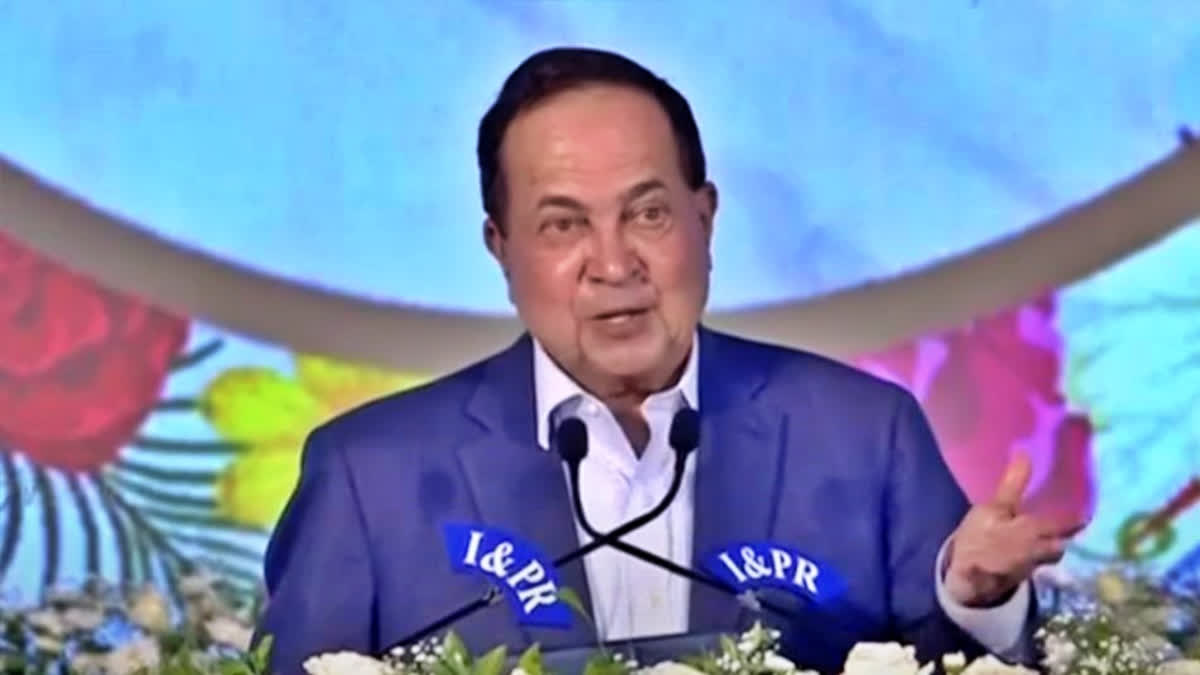Vijayawada: Senior Journalist and Director The Hindu Publishing Group N Ram Thursday said the best tribute to Padma Vibhushan awardee Ramoji Ram, who passed away on June 8, would be to stand up and fight for the values the legendary media baron stood for.
Ram, during his address at a high-level commemorative meet organised by Andhra Pradesh government here, spoke highly about Ramoji Rao and his contribution to journalism in India, recalling how the founder of Eenadu had stood for the principles of journalism, never shying way from speaking truth to power.
"We will not be honouring and commemorating the legacy of Shri Ramoji Rao, an outstanding and historic figure in the history of the Indian press, if we do not stand up and fight for the values of freedom, democracy and independence that he stood for. I particularly look forward to the veteran political leader, Chief Minister Chandrababu Naidu, for supporting this. Wherever journalists come under attack from, for example, anti-terrorism laws or laws claiming to protect national security, he will stand up and support this cause. I think he believes in it. This is our best tribute to Shri Ramoji Rao," Ram said as he addressed an august gathering of politicians, film stars, and key social figures.
Ram said he was proud of being Ramoji Rao's friend and someone who knew him for several decades. He recalled how he first got to know Ramoji Rao when the latter was the president of the Editors Guild of India in late 1980s.
"It was a time of deep churn and excitement in Indian politics, triggered mainly by journalistic investigations of corruption and abuse of power in high places. Bofors, which was being aggressively investigated by the press -- I had a role in that investigation -- had come to the centre of Indian politics. In July 1988, the Rajiv Gandhi government introduced the Defamation Bill 1988. It was an amendment proposed to the existing law of criminal defamation, and had more draconian provisions. These provisions were specifically targeted at investigative journalists and the media organisations they worked for," Ram said.
He added: "Much responsibility for seeing the protest movement through vested with the Editors Guild of India which then, as now, had its work cut out. I worked closely with Shri Ramoji Rao during this inspiring movement and was deeply impressed by his leadership qualities, firmness and steadfastness on the principles at stake, clarity on the goal to be achieved, that goal was unconditional withdrawal of the Defamation Bill. Also, wise diplomacy in allowing the government to save face."
"That was precisely what happened. The leadership of the movement and the lakhs of journalists involved stood, and to the credit of Prime Minister Rajiv Gandhi, when he realised what he was up against, he summoned an emergency cabinet meeting where he announced that the Defamation bill will be withdrawn immediately. He also signed the press release stating that a free press is an integral part of the inner strength and dynamism of our democracy. I remember even now Shri Ramoji Rao was quiet. He had complete satisfaction over the goal achieved, but there was no sense of triumphalism, not in the least," the veteran journalist said.
He called the founding of Eenadu a transformational moment, considering the innovation and embrace of new technology that it came with, combined with an uncompromising pursuit of high production values, and excellence in reporting, particularly ground reporting.
"Robin Jeffery, the Australian political scientist, in his book India's Newspaper Revolution, has a lot to say about the pioneering qualities of Shri Ramoji Rao and Eenadu, its marketing methods, coming with district editions, covering local news and issues close to the people, its pursuit of credibility, and serving up interesting and important stories. This was a transformative contribution to the Indian language newspapers," Ram said.
Ramoji Rao, he said, had a clear vision and knew that newspapers had every right to take political positions, but they must remain independent of government pressure and assault. "Whatever assaults came his way, we know what happened earlier and more recently, he stood brave -- basically saying that 'I will not give up the principles and the stand I have taken'. That is something that is rare today in Indian journalism," he said.
He also lauded Ramoji Rao's contribution to the Telugu language and to the world of cinema, and also recalled how he never bowed down to the pressure tactics.
"He stood for an independent and upstanding press. He believed in the credible information function of journalism. He believed in its critical investigative function, in its education function, and also contributed to setting a good agenda. Shri Ramoji Rao was targeted viciously as those who could not stomach the spirit of independence he practised all his life, thought they had detected a vulnerability, given that he had other and diversified business interests. They thought they could cripple his financial base, but they proved mistaken. His inner strength and resilience he had put to the organisations he had built and the governance he had put in place prevailed over such attacks," Ram said.
Referring to his conversation with Ramoji Rao's family members after his demise, Ram said that he learnt that he faced death stoically. "I learnt from them that he often spoke to them about death. Since it was inevitable, there was nothing to fear. One of his granddaughters yesterday at the hotel I was staying related this to me. I think he waited and achieved what philosophers term a good death," he said.



